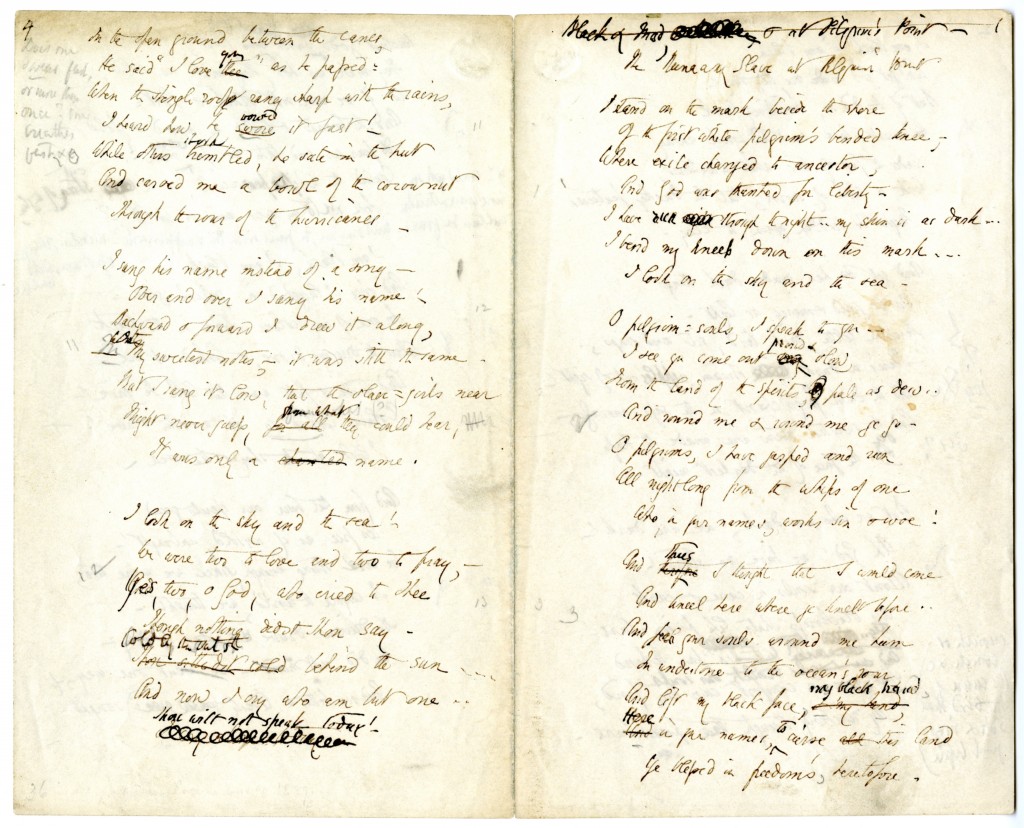Elizabeth Barrett Browning
Draft of “The Runaway Slave at Pilgrim’s Point” (Browning Guide D0800 and D0802)
Rare Item Analysis:
by Allie Matherne
The pre-fair copy manuscript of “The Runaway Slave at Pilgrim’s Point,” located in the Browning Letters and Manuscripts collection at Armstrong Browning Library (Browning Guide D0800 and D0802), allows scholars the opportunity to better understand the dynamics and intentions of the poem. This manuscript is especially rare as it contains notes from both Elizabeth Barrett Browning (EBB) and Robert Browning, denoting collaboration between the two.
This collaboration in itself highlights a key aspect of the poem itself—its genre. Robert Browning championed the dramatic monologue and spent much of his career perfecting the emerging genre. “The Runaway Slave at Pilgrim’s Point” is, in essence, a dramatic monologue. This genre thrusts the work into its context as it is intended as a reactive piece. The poem was written for the Liberty Bell, an American abolitionist’s annual that sought immediate action. Keeping in mind the genre and intent of the piece, the stark differences between the manuscript and the final poem published in 1850 in her collected edition The Poems of Elizabeth Barrett Browning create an imaginary link from the poem to EBB’s mind. To help bridge this chasm, we will observe a few multi-layered differences: the striking title change, a rhythmic change, and a change based on connotation.
The first and possibly most unusual change is the title. The title—“The Runaway Slave at Pilgrim’s Point”—was initially, “Black and Mad at Pilgrim’s Point.” This preliminary title completely shifts the tone of the poem. It drives the audience’s judgment of the character. EBB does not mention on the manuscript why she would make such a change, but the shift in focus is clear. The title is not an untrue representation of the narrator as she is black and does something mad (committing infanticide). However, if the poem would have retained the original title, the reader may have been less sympathetic to the narrator. The narrator appears to have something wrong with her from the beginning and the reader would have been less inclined to blame her circumstances—namely slavery—for her impending madness. If EBB had kept the original title, it would have overshadowed her purpose, which is to show the slave’s lack of agency.
There are many changes over the course of the manuscript. One interesting change is line, “And lift my black face, and my hand,” which shifts to “And lift my black face, my black hand” in line 19, third stanza of the 1850 version. This change emphasizes the assistance of Robert. “And” and “hand” are underlined in pencil and “my black hand” is written in pencil, but traced over in ink. The pencil marks are suspected to be Robert’s, while the ink is EBB’s penmanship. This indicates that Robert proposed this change to EBB and she confirmed the change by writing over it in pen. This change has many possible interpretations, but I will suggest two: rhythm and emphasis. The change drives the rhythm to a more spondaic, hard rhythm. By placing hard syllables in this line, EBB is able to strip the line of any suspected playfulness. The original line “and my hand,” includes internal rhyme, which lends to a more playful attitude. Additionally the emphasis remains starkly on “black” as the word is repeated. This is a consistent word used throughout the poem and clearly an emphasis EBB does not want to shy away from.
The final change I want to point out is one based on connotation. EBB initially wrote “Ah!–in their ‘stead, their hunter sons! Ah, ah! they are on me–they enring!” (204-5) in one of the final stanzas before the narrator is captured. Robert comments on the margins, suggesting she should strike out “enring.” He says, “Enring suggests to me ‘to shackle.’” She does change the word “enring,” indicating that, at the very least, her intention is not to suggest that the narrator is shackled. The final version of the line reads, “Ah!–in their ‘stead, their hunter sons! Ah, ah! they are on me–they hunt in a ring—.” There is both a mild and a strong interpretation of this change. The mild way to interpret this would be to say that she made this change because she did not want the reader to think the narrator is literally chained by the hunters. This reading contains few implications for the reading of the poem as a whole. Another, more intense, reading of the change could suggest that the shift from the narrator as being chained to being hunted demonstrates that the narrator has some agency as a whole. If she is chained, she has no way out, but if she is being hunted, there is room for her to escape.

 EBB-Transcription-RunawaySlave Draft-D800
EBB-Transcription-RunawaySlave Draft-D800


EBB-Transcription-RunawaySlave Draft-D802
